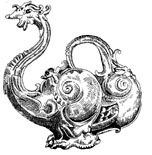
Catholicism Confronts New Age Syncretism
TO DABBLE OR TO DECIDE?
The National Catholic Reporter recently ran a story about the possibility that the Catholic feminist movement known as Women-Church was losing all connection with Catholic tradition. The underlying concern was that Women-Church, in its attempts to be inclusive of all women, was becoming syncretistic. That is, it was willing to accommodate many different spiritual traditions on an equal level with Catholic faith and practice. The report said that an upcoming Women-Church conference would have, in addition to rituals by witches, rituals led by “Buddhists, American Indians, Quakers and Jewish leaders — as well as by Catholic nuns.”
This syncretistic mentality is widespread in the Church today. Witness the following description of the program of a respected Midwestern Catholic center for spirituality:
Readings are selected every day from the sacred texts of Buddhism, Taoism, Hinduism, and Islam, as well as Christianity. On occasion, ancient festivals of the Celts or Saxons are remembered, and members dance around a maypole or fire-pit in the fields or forest…. The Chapel is visually stimulating and instructive…. Icons of Our Lady of Guadalupe and the Risen Christ are placed side by side with statues of Buddha, Lord Vishnu and Moses.
The pervasiveness of this spiritual attitude, much influenced by New Age trendiness, challenges the foundations of our Church. At the same time, however, it offers us an opportunity to re-examine those foundations and ask ourselves just what it is that anchors our identity as Catholics.
You May Also Enjoy
The only place in the Middle East where Christians face no restrictions on the practice of their faith is Israel, where they comprise two percent of the population.
Reviews of A Question of Values... The God Who Commands... The Logic of Solidarity... Outlines of Romantic Theology...
Childhood hunger, single motherhood, and other problems that proponents of abortion claimed would be solved by abortion have only gotten worse.

